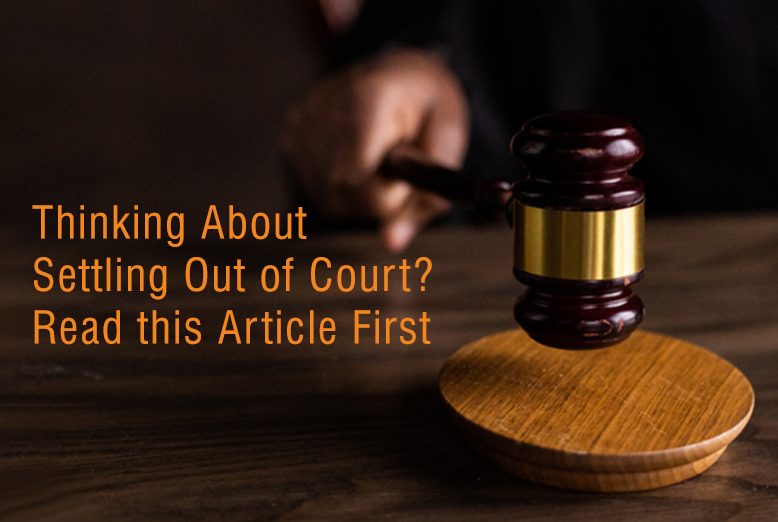Injuries due to someone’s disorderly behavior or negligence often lead to anger, suffering, and financial losses. Victims deserve compensation if the incident affects their quality of life. But should you reach an out-of-court settlement or fight for what’s fair by going to trial?
Data show that 95-96% of all civil cases settle out of the courtroom as one party in the lawsuit offers settlements by meeting specific terms, such as paying for negligence or damages. The case doesn’t go to trial if both parties agree, but there are critical factors to consider before accepting a settlement.
Things to Consider Before Settling a Personal Injury Claim Out of Court
A personal injury claim can be settled either out of court or through a lawsuit. Both options have their fair share of pros and cons. If you are thinking about an out of court settlement option, ask yourself the following questions before accepting a settlement:
1. Are You Working with an Experienced Personal Injury Attorney?
Many personal injury victims deal with insurance companies without legal representation, and only a handful of them succeed in receiving a settlement.
A personal injury claimants survey by NOLO revealed that 91% of victims with an attorney received a payout, while only 51% of those without legal representation received lowball settlements. So, hire an experienced lawyer to counter the insurance adjusters’ tactics before reviewing a settlement.
2. Have You Reached Pre-Accident Levels of Health?
Compensations for medical expenses, including future treatments, are essential to a settlement agreement. Before settling personal injury claims, conclude all medical treatments and ensure maximum recovery before calculating the total cost.
Permanently disabled clients should develop a care plan with professionals that accounts for ongoing medications, medical care, personal assistance, and consumable medical equipment. Don’t settle out of court until you know the expenses are covered.
3. Have You Considered All Damages Allowed in Personal Injury Claims?
After considering medical care expenses, victims can also demand compensation for the following:
- Emotional distress
- Lost income
- Pain and suffering
- Property damage (cost to replace or repair a vehicle)
- Loss of enjoyment
Property damage and lost income are classified as economic damages. With an experienced attorney, you can evaluate all losses resulting from the accident and get compensation for the damage caused by the injury to your daily life.
4. Have You Considered the Cost of a Personal Injury Lawsuit?
There are filing fees and other costs associated with personal injury lawsuits. Expenses in a personal injury case typically include:
- Administrative expenses
- Investigation costs
- Expert witness fees
- Court costs
- Deposition costs
In most cases, lawyers offer services on a contingency fee basis. They get a percentage of your money after reaching a settlement or winning your case.
Reasons to Settle Out of Court

Expenses such as court fees, expert witnesses, and preparation costs associated with going to trial are excessive for many victims. Settling outside of court could be helpful in avoiding these expenditures. Here’s why an out of court settlement is better:
1. Guaranteed Compensation
Understanding what you’ll get from the other party is a good reason to settle out of court. You don’t have to wait for a jury or judge to decide. The settlement terms are clear; your attorney can review and sign the paperwork.
2. Save time and Avoid Stress
Complex personal injury cases may take 2-3 years, while others can take about a year, but the appeals courts might overturn the results if you eventually win. The long days spent sitting at the table with your attorney, listening to the motions and objections, can create tense moments. Skip these worries by settling out of court and receiving your compensation much sooner.
3. Maintain Privacy
Going to trial means accepting that the case details will become public. However, cases settled out of court are between two parties who might agree never to discuss the case with anyone else.
Also Read: E-Courts: A Step Towards Transforming the Judiciary System




















